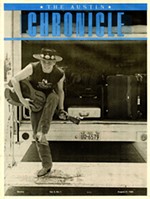Naked City
Texas: The Next Florida
By Lee Nichols, Fri., Oct. 11, 2002
Voter access: In more than half the surveyed jurisdictions, blind and visually impaired citizens cannot vote privately and independently. About 11% do not have a provisional voting process for those who claim to be legally registered but are not on the voter rolls. (This may have been a decisive factor in Florida in 2000.)
Vote counting: Few counties that use voting machines have total accuracy. Only 16% have machines with error correction technology, and only 47% have a procedure that allows voters to ask that their mistakes be corrected.
Election workforce: Only 45% of surveyed counties train all poll workers before every election, and only 63% have compulsory training for first-time workers. Also, possibly due to long hours and low pay, more than half the reporting LWV chapters report complaints of rude, unhelpful, or uncooperative poll workers.
Voter education: Only 25% of surveyed counties send out sample ballots before elections; only 20% maintain a voter-info Web site, and just 41% maintain a dedicated hot line for voters to get information about election day.
The LWV said it is still planning its agenda for the upcoming Lege agenda, but spokesperson Amy Ferrier says, "A lot of strides have been made since [2000]. Our league in Houston spends a lot of time training election officials, and a lot of effort has been made to update [election procedures]. We'll definitely keep a close eye on the elections this time." The full survey is at www.lwvtexas.org/Elections Report(1).pdf.
Got something to say on the subject? Send a letter to the editor.








